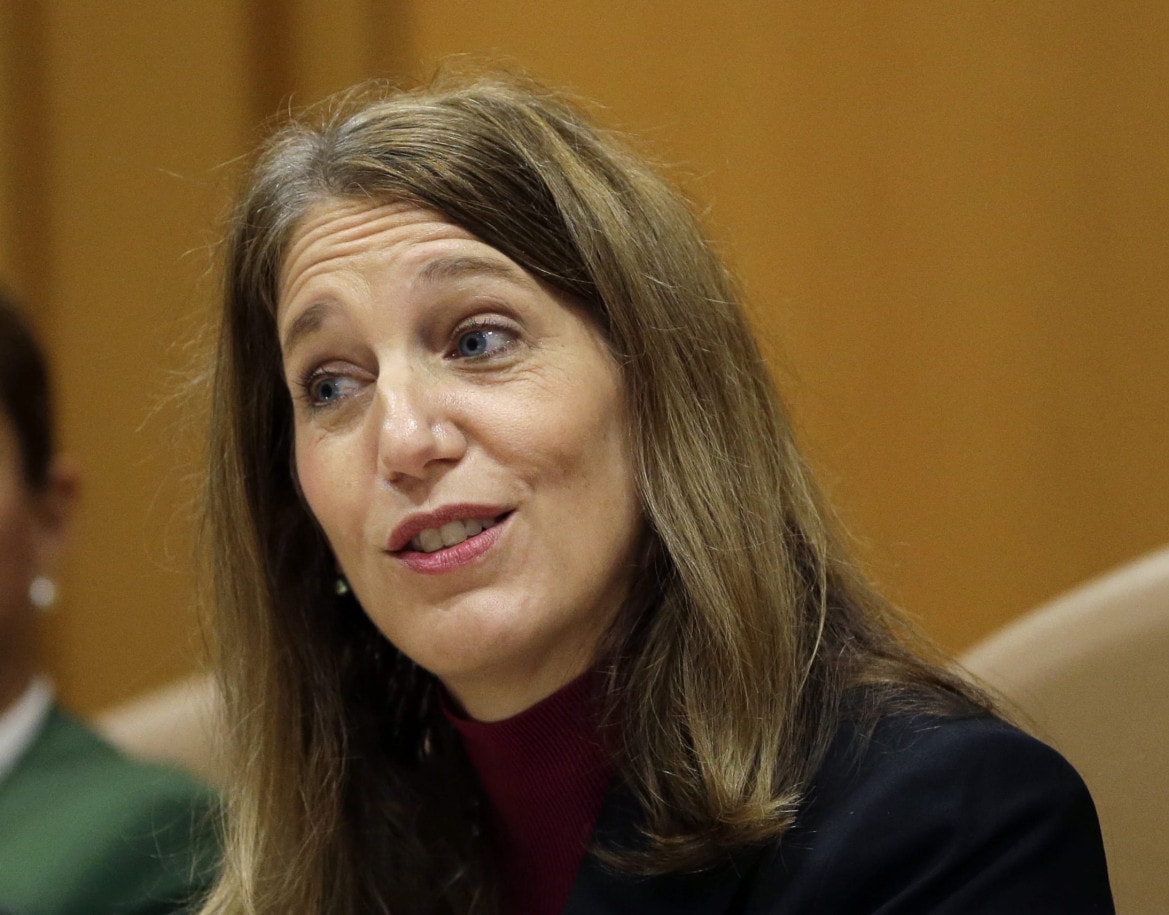Conversation: HHS Secretary Burwell Heartland Health Monitor talks with Burwell about Medicaid expansion, Obamacare and the cost of health care
 In this Nov. 17, 2014 AP file photo, Health and Human Services Secretary Sylvia Burwell speaks in Miami. (AP Photo: Alan Diaz, File)
In this Nov. 17, 2014 AP file photo, Health and Human Services Secretary Sylvia Burwell speaks in Miami. (AP Photo: Alan Diaz, File)
Published February 12th, 2015 at 4:14 PM
Sylvia Matthews Burwell succeeded former Kansas Gov. Kathleen Sebelius as Secretary of the U.S. Department of Health and Human Services in June 2014. Before that she was Director of the Office of Management and Budget. She has also served as president of the Walmart Foundation and of the Global Development Program of the Bill and Melinda Gates Foundation.
In a telephone interview earlier this week, she spoke with Heartland Health Monitor (HHM) about the Affordable Care Act, Medicaid expansion and a case before the U.S. Supreme Court that challenges a key element of the Affordable Care Act. Here are excerpts from that conversation:
HHM: Despite all the resistance to what’s commonly known as Obamacare, particularly in red states like Missouri and Kansas, it appears that enrollment numbers are actually rising. So I’d like to know how it looks from your perspective, especially in our neck of the woods.
Burwell: In Missouri we have 219,000 consumers that have selected a plan or were automatically reenrolled and in Kansas that number is 83,000. And as we look at each of those states, in Missouri 88 percent of the folks that are enrolled received premium support and the average amount of support is $284 per month. And so in Kansas, that number is 80 percent and it’s $214 per month. And so what we are seeing is people coming in using the marketplace and using the subsidies and assistance to make sure that they can get affordable care.
HHM: That brings up this question: There’s this case, of course, that bears your name in front of the Supreme Court, King v. Burwell. And as you well know, this case has the potential to undo a major part of Obamacare – the subsidies that we’re talking about, which more than 6 million people in more than 30 states have received, that have enabled them, as you say, to buy health insurance. What happens if the Supreme Court rules against you and rolls back those subsidies?
Burwell: So I think you probably know we believe Congress passed legislation to provide these subsidies and Congress wouldn’t pass legislation that said that people in New York should get these kinds of benefits and people in Kansas and Missouri shouldn’t. And so we believe we’re in a strong position with regard to what the law says, and we see these subsidies as making a difference in terms of how the system works, so that affordable health care is purchased. We know that in 2013 to 2014 we saw a drop in the uninsured adults by 10 million people in our country. And making health care affordable is a very important part of how that’s happening.
HHM: But if the court rules against you, what alternative plans are in place to address the fact that many people are going to lose their subsidies and may not be able to afford health insurance?
Burwell: In states like Missouri and Kansas in the individual market what you’d see is premiums go up. And finally there’s the indirect effect, which is that the uninsured number would go up. When uninsured goes up, indigent care or unpaid for care goes up, and that burden usually gets spread across all folks, including those in the employer-based market in terms of the premiums that they pay.
HHM: As you know, Missouri and Kansas are among the states that have refused to expand Medicaid under the Affordable Care Act. But it appears that HHS is willing to negotiate with states that want to expand Medicaid in their own way. Kansas is one of those states. For example, they’re talking about imposing fees on hospitals to pay for the state’s share of the costs of expansion and also talking about imposing work requirements on Kansans who would become eligible. How flexible is HHS willing to be in allowing states like Kansas to impose their own expansion requirements?
Burwell: We believe there are certain fundamentals that are part of that. Beyond that, we’re open to having conversations about what will work in individual states. As you probably know, we recently completed conversations with Gov. Pence in Indiana – had the opportunity to spend time with him – and they are already implementing the expansion in Indiana. … One of the first things I did as secretary is go to the National Governors Association and make sure the governors knew I’m open to these conversations. We know different states have different needs. There are some fundamentals that are important to making health insurance work. Those we need. Beyond that, in terms of how people think about incentives and programs, are things that we can have discussions about.
HHM: So have you been in contact with anybody in the state of Kansas about their plans to expand Medicaid?
Burwell: Conversations have not started with the state. But every day I look forward to continuing and starting new conversations involved in a lot across the country and hope that in Kansas that that can happen.


